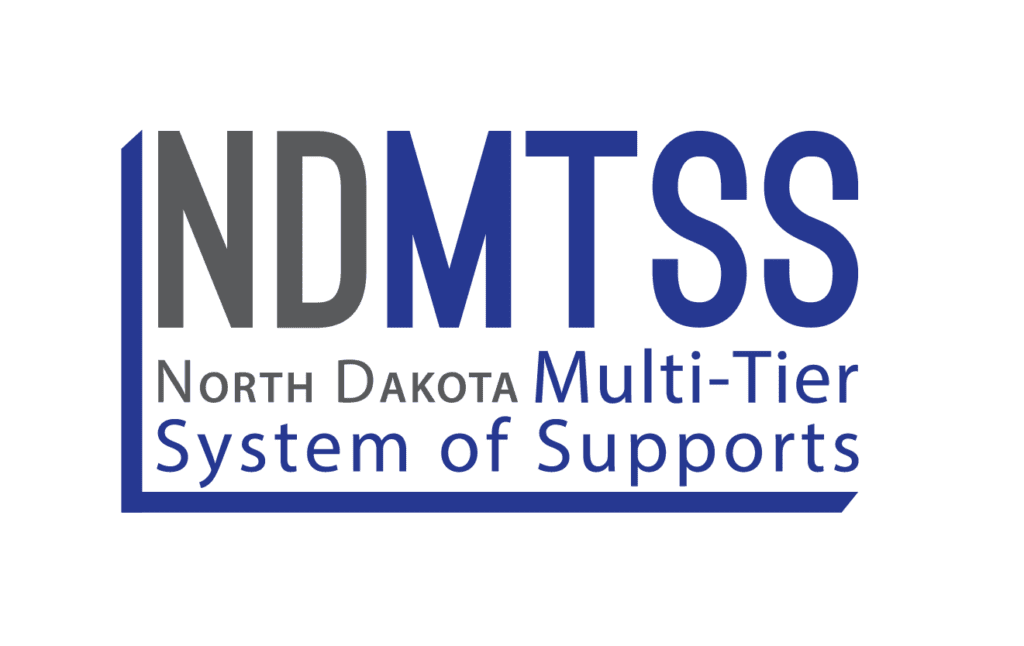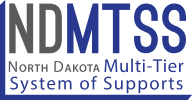About ndmtss
North Dakota’s Multi-Tier System of Supports (NDMTSS) is a framework designed through the lens of continuous improvement to guide school districts, schools, and all educators to ensure each and every student has access to learning experiences that enhance their educational outcomes.

Our Mission
Our mission is to empower schools to support and prepare all North Dakota students for success.
We Believe…
- Effective teachers create environments where all students can learn and improve.
- Effective schools maintain and communicate a purpose and direction that commit to high expectations for learning as well as shared values and beliefs about teaching and learning.
- Effective systems support both teachers and students by outlining evidence-based instruction and interventions while ensuring appropriate and equitable access to resources and supports.
NDMTSS at a Glance
NDMTSS Encompasses
- High-Quality Tier 1 Core Instruction
- Multi-tiered Instruction and Intervention
- Positive Behavioral Interventions and Support (PBIS)
- Valid and Reliable Assessments
- Capacity Building for All Educators
NDMTSS Is...
- A framework to provide all students and educators with the best opportunities to succeed
- A continuous improvement process
- Addresses the whole child (academic, behavior, social-emotional)
- Dedicated to eliminating barriers and increasing equity for all students
- Focused on providing high-quality instruction and interventions matched to student need
- Ongoing progress monitoring to make decisions about changes in instruction or goals
- Committed to using evidence-based resources
NDMTSS Is NOT...
- A verb, a time, a place, or a program
- Not “just for some students”
- An identification system for Special Education or Title I
- Content specific
- Test into MTSS, exit out of MTSS, or be done with MTSS
- Cannot be done by a small group of educators
How We Got Here
Several acronyms have been utilized during the development of what we now refer to as Multi-tier System of Supports (MTSS). Originally developed from a Response to Intervention (RtI) focus on early intervention services in behavior and academics, this work has been named many things: Positive Behavior Supports (PBS), Positive Behavior Intervention and Supports (PBIS), RtI -Academic (RtI-A) and RtI-Behavior (RtI-B). As research continued nationally, ND shifted to a more encompassing definition of Multi-Tiered Systems of Support (MTSS) to ensure that the infrastructure and focus on developing the system would be created that encompassed both behavior and academics.
Essential Components to NDMTSS Success
Why we do this work?
The purpose of MTSS is to provide adequate and equitable tiered support for all students while also supporting educators and administrators to more effectively and efficiently help students succeed.
MTSS is designed to help every student succeed and for every teacher to know how to help each student. With MTSS, teachers are able to better evaluate student needs and match instruction, resources, and interventions accordingly. MTSS places a strong priority on prevention and early intervention.
- MTSS provides a system for continuous improvement and ensures that everyone has a common understanding of implementation and outcomes.
- MTSS allows district policies to remove barriers to effective implementation
- MTSS helps schools organize resources by aligning academic standards and behavioral expectations.
- MTSS supports educators and administrators to help students more effectively and efficiently.
Layered Continuum of Supports
-
TIER 1 CORE
Designed to enhance family engagement, staff wellness and community involvement. -
TIER 2 TARGETED
Designed to support some students when Tier 1 Core supports alone are not meeting their social, emotional, behavioral, physical, environmental or academic needs. -
TIER 3 INTENSIFIED
Designed to support a small percentage of students who still may demonstrate unfinished learning with Tier 1 Core and Tier 2 Targeted supports or exceptional learning requiring additional acceleration. -
Specially Designed Instruction (SDI)
Refers to adaptations to the content, methodology or delivery of instruction to address the unique needs of the child that result from child's disability, ensure access to the general education curriculum so that the child can meet the educational standards that apply to all children, and are funded and guaranteed by IDEA and implemented via the individual educational plan (IEP) process.







